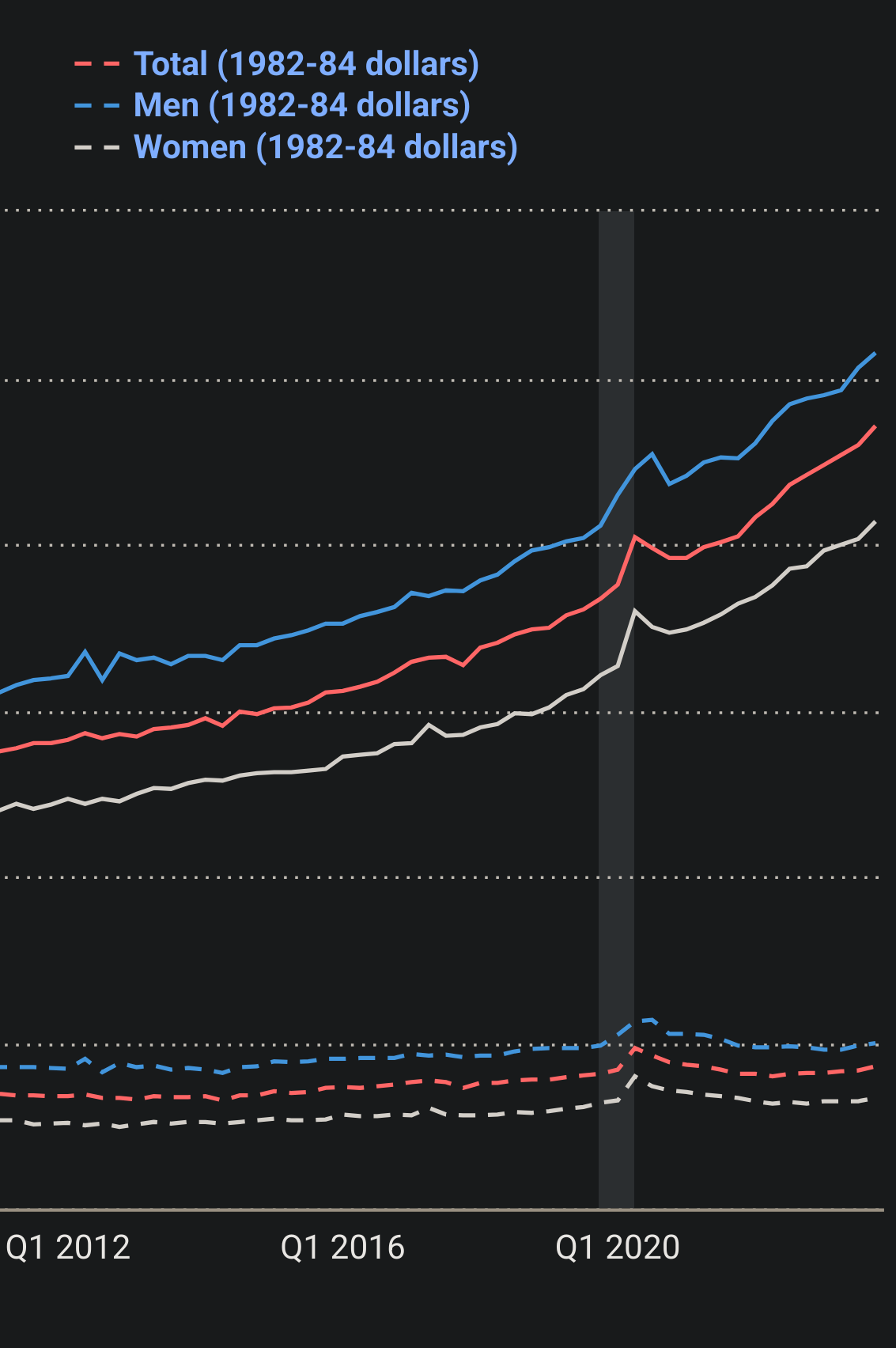US consumers remain unimpressed with this progress, however, because they remember what they were paying for things pre-pandemic. Used car prices are 34% higher, food prices are 26% higher and rent prices are 22% higher than in January 2020, according to our calculations using PCE data.
While these are some of the more extreme examples of recent price increases, the average basket of goods and services that most Americans buy in any given month is 17% more expensive than four years ago.
If you want to know why Americans are bummed out about their purchasing power, just look at this chart about how wages abruptly stopped increasing with productivity 45 years ago. People are accomplishing more than ever before in history and being left with less buying power. In many cases wages don’t even keep pace with inflation because companies pay based on what they can get away with, not what the work is worth.
Productivity and wages aren’t intrinsically linked.
Say you’ve got someone digging a trench with a manual shovel, and then the Bobcat is invented. Let’s say that the Bobcat lets someone do five times as much digging. The wage paid isn’t going to be five times the shoveler.
The wage will be set by whatever it takes to get ahold of someone who can operate the Bobcat. That’ll depend on how many people are out there who can operate a Bobcat, and what else they might be doing.
The only guarantee is that it won’t be more than five times the manual shoveler, because then (setting aside, for a moment, the non-labor costs) digging the thing with the Bobcat would be less-efficient than having it manually-shoveled.
In fact, productivity and wages can be inversely-correlated.
Let’s say that instead of a Bobcat operator and a manual shoveler, where the skillset is different and the pool of people who can do each may differ, you have some technological improvement that doesn’t change the pool of labor at all. Let’s say that someone suddenly realizes that the Bobcat shovel could be twice as large and it can scoop twice as much. Ignoring, for simplicity, things like setup time, suddenly every Bobcat operator is twice as productive.
Now, usually there’s some level of price elasticity of demand. If you can make something more-cheaply, then more people will buy it – some people wanted a trench but it just didn’t make financial sense, but now suddenly it does. But let’s assume that demand is entirely inelastic. There is still the same amount of demand then, even if the trench can be dug more-cheaply, and the same amount of trench will be dug.
In that case, one only needs half the number of Bobcat operators. The market allocates workers based on their wage – pay more, more people will be willing to do a job, pay less, and fewer will. What will happen is that Bobcat operator wages will drop until about the required number of Bobcat operators are willing to do the work. Those who were already on the edge will exit the field, do something else.
Wages can also change when productivity doesn’t. North Dakota had an oil boom about twenty years back. There weren’t nearly enough people to work the fields. Wages skyrocketed, and people entered the field or moved to the area. They weren’t more-productive than the previous workers. They were paid more because the supply was limited; paying more resulted in the needed number of workers showing up.
Wages can closely track productivity in some situations. Suppose you have zero price elasticity of supply – that is, no new workers are able/willing to enter a field, no matter what wage is being offered. And there is infinite price elasticity of demand – in practice, immense demand for the thing at the particular price, but not above that. An example – maybe a bit contrived – would be if a number of people with identical cars all locked their keys in their uninsured cars prior to a flood, and a lone locksmith is available. They can break a window to get their keys and rescue their car, or have the locksmith open the car. Anyone who can will pay the locksmith to open the car for up to the cost of replacing the window, but not more than that. There is no time for more locksmiths to show up – supply is inelastic. In that case, if the locksmith could manage to open a car in half the time, he’s be paid twice as much.
But normally, wage serves the role in a market of allocating workers to a given field. It isn’t directly bound to productivity. And you wouldn’t want it to do that, because that’d kill its use to do that labor allocation, which is how the market moves workers where they’re needed. Let’s set aside practical difficulties and imagine that we could pass a law to lock productivity and wage. Suppose it resulted in a lower wage than market rate – as it would with the North Dakota oil workers above – then you wouldn’t have enough workers, and oil that should be extracted would go unextracted. Suppose it resulted in a higher wage than market rate, as it would with the Bobcat operator above. Then you’d have a line of capable-of-using-a-Bobcat people, all of whom want the Bobcat operator’s job. In practice, because the wage is locked, non-wage compensation probably changes – that is, the conditions of the job get worse. The Bobcat operator has to be on-site the instant the job starts, any mistake on his part and he’s immediately replaced, etc. And you have the crowd of people trying to get his job probably trying to offer bribes and the like to get him ejected and themselves put in place.
You sound like an economist.
jeezus Christ Lemmy. what’s up with the downvotes?there is one response at this time and 16 downvotes. the response isnt even disagreeing with the sound theory presented, just saying that our system is too fucked up to work right.
I thought this community was better than this.
Because it’s a wall of text trying to justify why we’re all struggling, and I think people are just done trying to engage with such “galaxy brained” theories that are completely removed from our lived realities. Especially when people probably have better things to do than some point-counterpoint internet argument.
Not to mention, this “sound theory” is just that: a theory. Frankly, all of economics is entirely made up! That’s not to say it’s not a valuable and important study, but it’s also not based on any natural laws. It’s an entirely human construct and something we don’t fully understand. ANY economic theory can be torn apart in thousands of ways by adjusting the models a bit. In the west we’ve been fed the theories from Margaret Thatcher and Ronald Reagan for longer than most of us have been alive, and it seems like those theories are falling apart around us! I think a lot of people are seeing that when GDP goes up and “the markets” go up, we don’t get anything. But when “the markets” go down, we have to immediately shoulder the burden. We see our hard work being absorbed by investors seeking their ROI. We see our loyalty repaid by mass layoffs so executives and investors can earn even higher profits.
So when someone tries to justify it all using the same theories and models that seem to be causing the problem, I don’t blame people for just down voting and moving on.
We’re tired of being trickled down on and it’s time for a new theory.
the downvote button shouldn’t be a disagree button, but a your not adding anything to the conversation button.
Anyone who argues against knowledge and science should immediately be disbarred from the democratic process.
Corporate price gouging
Well that 1% guy wasn’t joking when he said “You will own nothing and be happy.” Except for the “you will be happy” part. They’re doing this to us on purpose and they have their reasons.
Yeah, y’know, just kinda bummed out.
Bit mitted about it.
the average basket of goods and services that most Americans buy in any given month is 17% more expensive than four years ago.
That’s 4% per year
And now much has pay gone up?
They claim it’s gone up more than that, but I’m very curious where they’re getting these numbers.
Here’s US bureau of labor statistics:
Pay went up faster than inflation compared to before the pandemic
That graph shows real wages as being flat for the last 24 years, and even the bump you mentioned was barely noticable and fell back to baseline in like a year.

What would the chart look like when we exclude billionaires, C-suite executives, and everyone else who gets paid to own stuff instead of working for a living?
It looks flat, but real wages are up 10% in the last 24 years, highest ever
If we exclude billionaires it will decrease like $0.01 because it’s the median
Alternate headline: “Why Humans Dislike Being Poor”
Americans are right now at some of the best economic times, so that’s surprising
There is a disconnect between the statistics and reality. I am not sure where, but I suspect inflation is not being calculated correctly. It may be that lower cost items rose at a higher rate, so even though it averages out, it’s harder to reduce spending. 17% doesn’t seem to match the numbers I’ve seen for take out and home prices for example.
At the end of the day, it doesn’t matter what’s on a chart it matters how many things people had to choose to not buy or do because they couldn’t afford it.
Food goes up 20%, Consumer electronics go down 20% and they’ll call it zero inflation. Not an exact example but an illustration of why things dont feel right. The things you have to buy most often are rising faster than the luxuries. Education, Healthcare, Housing it’s a similar story there.
Rent/housing is like a third of CPI, it’s already being taken into account. Remember, CPI already talked into account these numbers, including higher food costs. But it also takes into account that energy costs did not increase as quickly. Even if some things went up 30%, if other things go up 10% the average can’t possibly be 30%
Also consumer spending is very strong in America right now, so even if some people can’t afford things, other people are way outspending them
The CPI only takes rental prices into account, not home purchases or rental values. Additionally, it only captures active rentals, not asking prices, meaning that it has significant lag and is a poor indicator for trends in rental prices.
This is true, but the average person is paying a mortgage or rent, not moving every single month so the current rental price is the most relevant to people’s expenses
There is a disconnect between the statistics and reality.
No, there is a disconnect between statistics and perception.
The statistics are reality.
That is a shocking take in my opinion, one that borders on delusional. Statistics are the result of specific metrics collected by people who chose what specific data points to collect, the methods of collecting those metrics and chose the methods of presenting the data. They can reveal interesting aspects of reality that aren’t otherwise obvious and can depict a fairly accurate representation of reality as a whole if they are created in ernest using sound data collection techniques, but I’m pretty sure that the most qualified data scientists will disagree with the statement that “statistics are reality”. Especially if anyone in control of any part of that process has significant motivation for them to depict something specific.
Statistics are only meaningful when you put them into context of their intent, limitations and error rate.
Lies, damn lies, and statistics
And even if the statistics hold true in aggregate, it’s not the full picture and can’t accurately describe or predict individual experiences. Perception is anecdotal, so it is not a perfect depiction of reality either. But if perception does not match the data, it’s an indicator that the data might be suspect.
but I’m pretty sure that the most qualified data scientists will disagree with the statement that “statistics are reality”.
Only because scientists are absurdly cautious in nature.
Statistics are reality when compared with a different interpretation that is wildly diverging from all statistics. Fuck the equivocation and the “maybe” and the “suggest that possibly”. On something this stark, we can use very clear language:
The statistics represent reality. The complaining about the economy represents perception.
I feel like you’re putting me in a position to argue against the scientific method, but I don’t think that’s actually the case. Statistics can be scientific, they can also be wrong. The scientific process allows for skepticism. To not consider questioning the methods given opposing perspective is not scientific, it’s dogmatic.
The statistics may very well be accurate, but your level of faith in them is disturbing.
You’re suggesting that since statistics are fallible, it’s entirely possible that the sun doesn’t shine during the day, despite the wealth of evidence that the sun does in fact shine during the day.
No. Fuck that. The cautiousness of the “global warming is just a theory” scientists enabled the regressive anti-science bastards. I’m not placing the whole of the blame on the scientists. I’m just saying that equivocating when there is a preponderance of evidence can have real world harm by giving credence to fabrications.
If we were in a situation where we all agreed on a basic level about the general accuracy of the statistics, then we could drill down into what, specifically, is more accurate than others. I definitely have my qualms about how the CPI is calculated for example, and how the unemployment rate is calculated.
But when we’re in a situation where bad faith actors are trying to discredit the broad findings that all the stats and scientists agree on, we need to close ranks and tell them in no uncertain terms that they are wrong.
Didn’t they just adjust the whole inflation index again to not count a bunch of significant things? It’s a joke.
Same with unemployment. It only counts “able individuals who are actively searching for a job”. A lot of people aren’t included in those numbers when they should be.
Is it because of the economy? That’s my first guess.
No, because we have some of the best economy ever
We’ve had higher median real incomes than Q4 2019 since Q3 2022
The whole 2020 decade so far has higher incomes than any point in US history








